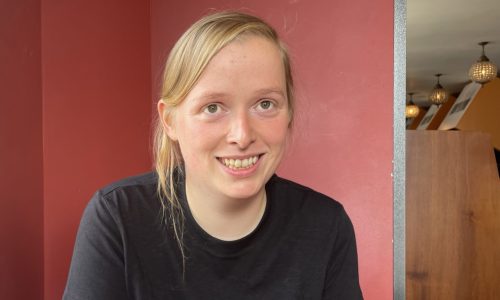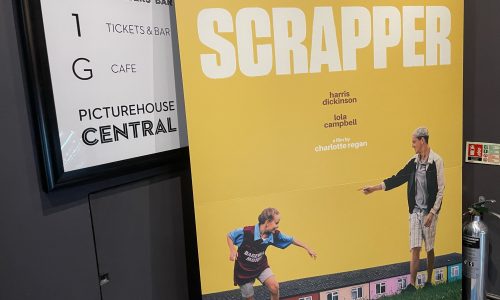Sundance conjures up images of quirky American independent cinema – but this year’s London showcase from the Sundance Film Festival opens with a British film. But it certainly has that quirky Sundance sensibility – a social drama, underscored with humour and warmth.
Scrapper – which won the Grand Jury Prize in Utah back in January – is the debut feature of writer/director Charlotte Regan, a Londoner with a background in music videos and a passion for Arsenal.

Indeed, her back-pack, she explained as she made room for me to sit down for a chat, was full of Arsenal T-shirts – not, as you might expect if you’ve seen her film, a West Ham top.
Twelve year old Georgie – played by newcomer Lola Campbell – wears a West Ham T-shirt for most of the film, as there’s no-one to tell her not to; since the death of her mother, she’s been living alone, ingeniously tricking social services into thinking she’s with her uncle – Winston Churchill.
But Regan’s story takes flight with the unexpected arrival of her estranged father, Jason, played by Triangle of Sadness actor Harris Dickinson. While the background to the film is about grief, the restoration of her relationship with her estranged father – after some initial challenges – ultimately makes for an uplifting experience that will resonate with anyone who’s fallen out with loved ones.
This is a film about bereavement and reconnection. Growing up, responsibility and earning respect. Was any of this personal to Regan? “The only personal relevance was the working class community and the way i wanted that to be told in the film. But not the characters.”
She didn’t experience loss as a child, like her protagonist, but she did lose her father a few years ago. “I read loads of books about grief and the content I liked best was the kids outlook, because when we’re kids, we have a magical way of looking at things, so I found that I was more drawn to the books that had involved kids talking about grief. And I remember growing up, the perspective you’re able to have as a kid where you look at the best in everything – so I think that magical outlook helped me with my grief. You meet lots of those kids who are so resilient and so independent but capable of being incredibly childish when they need to be. I’m like that.”
So if that was the genesis of her main character, how did she find first-time actress Lola Campbell to bring the role to life? Her casting director Shaheen Baig led the hunt. “It was quite a long search that went on for two years, almost. Shaheen reached out to clubs, schools, that kind of thing. But as soon as Lola sent a tape in, we kind of knew. She was talking about Home Bargains for five minutes, and I was like ‘The Home Bargains girl – she’s the one.’ I think she’s the best actor I’ll ever be lucky enough to work with.”
Dickinson as the reformed loser, learning to grow up alongside his daughter, was easier to find. “Harris, I’d worked with a few years prior on a short film, so we knew each other through that and I’ve followed and I love his work. He’s an incredibly selfless actor – and I don’t think any other actor would have supported Lola and Alin (Alin Uzun plays Georgie’s best – and only – friend, Ali) like he did.”
Regan’s style as a director is relaxed and clear, with humour injected into the narrative by commentary from other children on Georgie’s estate, her teacher and her social workers, speaking to camera, mockumentary style. But more interestingly, there are times where she has to lead the viewers into Georgie’s mind, which she does using fast-cut montages, a technique evolved with her director of photography, Molly Manning Walker, whose own debut feature as director, How To Have Sex, recently premiered at Cannes. She also came up through music videos. Regan believes the feel of music videos fits well with getting into the mind of a child. “I love the style of videos we’ve grown up with. Then there’s the child’s perspective. I’ve done a documentary recently, for the Guardian, about kids during their summer holidays, and you find if you give them a pack of Haribos, suddenly the world is a much hyper place and then they have these big crashes and I wanted to match that kind of childlike energy and I wanted it to be her film and have her take control of the storytelling.”
Both Regan and her DP have been supported by the BFI. Scrapper was also backed by BBC Films, while How To Have Sex was produced by Film 4. Regan is modest about how she managed to secure her producing partners. Indeed, she’s modest about how she got a break in the industry at all. “I got really lucky and met the BBC and the BFI and they’ve supported me for years and let me really discover the story I wanted to tell. I don’t think you get that with other companies. I got sick of music videos one year and made a short film, Standby, and I got really lucky. It did well and got nominated for a BAFTA and off the back of that, I got loads of offers for future work. Otherwise, my family didn’t come up in the art world so I never really thought of it as something you could make money in, so I just fell in with the right people at the right time.”
Regan is grateful for the opportunities the pillars of the British film industry have thrown her way. “We’re so lucky that we have, in the UK, the BBC, the BFI and Film 4, as they give you the space to write the film you want to write. They’re not results driven. They’re all about your long-term career. Without them, I don’t know that I would’ve been able to sustain a career in the film industry. I’m trying to think of what else I would’ve done, because my GCSEs were bad and I haven’t got many skills.”
 But it’s not just the British film industry that’s given Charlotte Regan such important backing. The Sundance Institute, whose festival has given her debut film such an important launch internationally, has also been supportive of her career for some time. “I did an Ignite scheme – similar to what you can do with the BBC and the BFI – so I’ve been part of the Sundance community for a while. They’re incredibly supportive and amazing people to be alongside.” But how helpful opening the Sundance London festival will be to her career, she’s less certain. “How it fits in? Who knows? I try not to think about it. We made the film. That’s the best part. Everything else that comes after, who knows?”
But it’s not just the British film industry that’s given Charlotte Regan such important backing. The Sundance Institute, whose festival has given her debut film such an important launch internationally, has also been supportive of her career for some time. “I did an Ignite scheme – similar to what you can do with the BBC and the BFI – so I’ve been part of the Sundance community for a while. They’re incredibly supportive and amazing people to be alongside.” But how helpful opening the Sundance London festival will be to her career, she’s less certain. “How it fits in? Who knows? I try not to think about it. We made the film. That’s the best part. Everything else that comes after, who knows?”
Bubbling with enthusiasm for the industry, Regan knows that after getting this opportunity – and having bad GCSEs and not many skills – film-making is something she wants to continue. “Hopefully. I see it as a super fun job. It feels mad that you can even call it a job, cause you just get to mess (she actually used a word that begins with F) around with loads of good people on set and make stories up for a living.” Tell me you work in film, without telling me you work in film.
